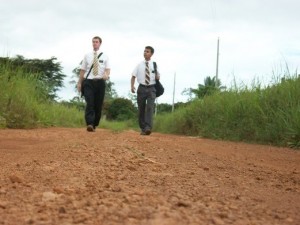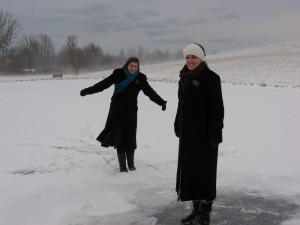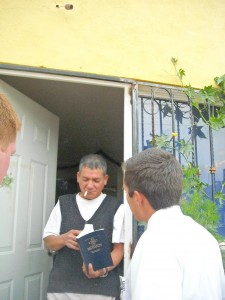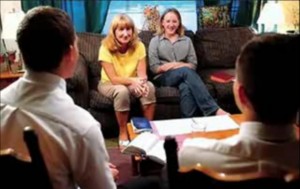 You have probably already met a couple of LDS missionaries. They’re the young men in dark suits and bicycle helmets, or the young ladies wearing skirts; they all have black name tags. Maybe it was at your front door (or your back door, if you live in Wisconsin), or it could have been on the street, or a gas station, or at a friend’s house. They waste no time searching for people to declare the gospel to.
You have probably already met a couple of LDS missionaries. They’re the young men in dark suits and bicycle helmets, or the young ladies wearing skirts; they all have black name tags. Maybe it was at your front door (or your back door, if you live in Wisconsin), or it could have been on the street, or a gas station, or at a friend’s house. They waste no time searching for people to declare the gospel to.
Odds are, you didn’t hear their message. Maybe you were in the middle of repairing your truck, or you were in a bad mood from a long day at the office, or you thought they were Jehovah’s Witnesses. Could be you were curious of what they had to say, but didn’t want to let on. Mostly, you didn’t know what to expect.

It’s understandable. I hate being blindsided by unexpected surprises; not knowing what’s coming or how to control it. Missionaries approaching you out of the blue is the epitome of being caught unaware. My hope with this article is 1) to teach you what you can reasonably expect from these young men and women and 2) to give you some ideas of how to act the next time they arrive.
The Greeting
 A missionary’s purpose is to share a vital message with you; it’s so important that they dedicate two years of their lives on their own dimes to come present it to you and your neighbors. When they are new to being a missionary, they learn quickly how important trust is. In order for their message to change lives, it must first be heard; for the message to be heard requires a person’s trust. Establishing trust within 15 seconds at a complete stranger’s doorstep is a truly daunting feat!
A missionary’s purpose is to share a vital message with you; it’s so important that they dedicate two years of their lives on their own dimes to come present it to you and your neighbors. When they are new to being a missionary, they learn quickly how important trust is. In order for their message to change lives, it must first be heard; for the message to be heard requires a person’s trust. Establishing trust within 15 seconds at a complete stranger’s doorstep is a truly daunting feat!
From my own experience, I can testify that most missionaries are trustworthy. They are typically honest, clean, kind, and very respectful of other’s beliefs. It’s difficult to establish all of this in the first few moments of introduction, but they will try. They will shake your hand, introduce themselves as representatives of the LDS Church, give their names with a smile, and ask to be invited inside for a discussion. The hope is that you will see or feel in them some spark of goodness that will persuade you to give them just one fair hearing. Sometimes it happens, often it doesn’t.
Imagine that you are at this moment of decision: consider your options. If you are like me, your gut will tell you to avoid the hassle, avoid the awkwardness of meeting new people and turn them away. But, if you had a few minutes to weigh the consequences, your sense of adventure might say, “What the heck! They’re no threat; I’ll listen to ’em. I can TiVo American Gladiators tonight.”
I hope that wherever you are, you will decide right now to invite them in next time. Give them a chance. If not, at least be civil. A polite “No, thank you” is exactly as effective as a tirade of verbal abuse at keeping them from returning, so save your energy.
Let’s assume you invite them in. Once inside, they won’t usually dive right into a religious discussion. They will chat politely about your family, your job, hobbies, etc. They will also be glad to answer questions you have about their backgrounds. Ask them where they are from, what they plan to study in college, how long they have been missionaries, etc. Again, they hope to establish a good relationship of trust with you. This isn’t merely a gimmick; they really are interested in you because they hope eventually to become your friends. If there’s one thing Mormon missionaries believe in (besides their message), it’s that everyone is a potential friend. There are people I met on doorsteps as a missionary that I grew to love and I still keep in contact with.
Their Presentation
 At some point, the missionaries will change the topic to religion and begin the presentation they arrived on their missions to give. They may request to begin with a prayer in order to invite the Holy Spirit. Because they are guests in your house, they will allow you to decide who should say the prayer and it’s just fine to pick one of them or to say it yourself. Do whatever you feel most comfortable with.
At some point, the missionaries will change the topic to religion and begin the presentation they arrived on their missions to give. They may request to begin with a prayer in order to invite the Holy Spirit. Because they are guests in your house, they will allow you to decide who should say the prayer and it’s just fine to pick one of them or to say it yourself. Do whatever you feel most comfortable with.
Many people assume that the message they have to share will basically mirror a typical sermon from their local pastor, about Jesus suffering on the cross and how we can be saved if we believe in Him. This is central to our beliefs and essential to understand; it will take a prominent role in the lesson, but the missionaries will go deeper into what makes the Church of Jesus Christ of Latter-day Saints unique. The message is not only that Jesus saves, but that Jesus speaks.
The lesson is known as the Restoration of the Gospel. Just as this is the first thing the missionaries teach, it was the first thing we published on this website two years ago. Go read it! With more familiarity on the topic beforehand, you will have better comments and questions. You’ll also be better able to listen to the whispering from the Holy Spirit during the meeting.
During the presentation, the missionaries will take turns discussing each topic. It may sound somewhat rehearsed (because they do rehearse it; the rehearsals help them cover the essential points within a reasonable time-frame; their visit will probably last no longer than 20 minutes unless you invite them to stay longer), but I hope you will recognize that the missionaries really believe it. They are committed to it. You can also help them out of rehearsal mode by showing interest and asking them questions along the way.
Future Visits
The missionaries will end their talk by asking you to read from the Book of Mormon, ponder over the message, and pray to God about it. They really don’t expect you to believe them at their word (you are still essentially strangers after all), but they have full confidence that Heavenly Father will confirm the truth through the Holy Ghost. They will want to follow-up and see how He answers you, so they will request a return appointment, usually within a week.
 My advice is to take their commitments seriously: read, ponder and pray all week. Asking God if their message is true can do no harm, and it will do plenty of good. Also, get their phone number so you can contact them if you need to reschedule or if you have questions or concerns that just can’t wait.
My advice is to take their commitments seriously: read, ponder and pray all week. Asking God if their message is true can do no harm, and it will do plenty of good. Also, get their phone number so you can contact them if you need to reschedule or if you have questions or concerns that just can’t wait.
They have several more lessons, so they hope you will keep inviting them back after each visit. Each subsequent lesson will resemble this first one except a bit longer (maybe up to an hour), they might bring along someone from the local congregation, and every visit you’ll move steadily from complete strangers to solid friends. In fact, I’d wager it won’t be long before you’re asking them to come for dinner.
I’d like to open the comment section to stories of when the Elders or Sisters came to your house for the first time. What was the experience like? What did you learn from it? Have they been back since? If you don’t have a story to share, invite the missionaries over by clicking here!






 As you well know, the people of Haiti are in desperate need. The earthquake that hit near the capital has already decimated the population and more are in danger as their injuries and wounds lie unattended. People from around the world have been congregating on the island to help, including an airplane full of returned LDS missionaries who served in Haiti, know people there, and speak the language fluently. Here is a
As you well know, the people of Haiti are in desperate need. The earthquake that hit near the capital has already decimated the population and more are in danger as their injuries and wounds lie unattended. People from around the world have been congregating on the island to help, including an airplane full of returned LDS missionaries who served in Haiti, know people there, and speak the language fluently. Here is a